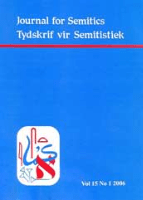
Journal for Semitics
Scope & Guideline
Unveiling New Perspectives on Semitic Literature and Linguistics
Introduction
Aims and Scopes
- Linguistic Analysis of Biblical Texts:
The journal emphasizes the exploration of grammatical structures, syntax, and semantics within Biblical Hebrew and other Semitic languages. This includes detailed examinations of verb forms, noun usage, and syntactic constructions. - Intertextuality and Translation Studies:
A focus on how biblical texts interact with each other and with other ancient literature, including studies on translation practices such as the Septuagint and Peshitta, as well as intercultural translation criticism. - Cultural and Historical Contextualization:
Research that situates biblical texts within their ancient Near Eastern context, exploring themes of socio-political dynamics, economic structures, and cultural practices. - Theological and Philosophical Reflections:
The journal also engages with theological interpretations and philosophical inquiries, addressing themes such as theodicy, ethics, and ecological readings of scripture. - Innovative Methodological Approaches:
Utilization of diverse methodologies, including psychoanalytic readings, cognitive linguistics, and frame semantics, to enrich the understanding of biblical texts.
Trending and Emerging
- Ecological and Environmental Readings:
An increasing number of articles are exploring ecological themes within biblical texts, reflecting a growing interest in environmental ethics and the relationship between scripture and nature. - Interdisciplinary Approaches:
There is a trend towards interdisciplinary studies that incorporate insights from fields such as sociology, psychology, and cultural studies, allowing for richer interpretations of biblical texts. - African and Global Perspectives:
Recent publications highlight African interpretive resources and global perspectives on biblical texts, indicating a shift towards inclusivity and the recognition of diverse cultural contexts in biblical scholarship. - Trauma and Psychosocial Analysis:
Emerging themes related to trauma readings of biblical texts suggest a growing interest in understanding the psychological dimensions of scripture and its relevance to contemporary issues. - Sociolinguistic Perspectives:
An increasing focus on sociolinguistic aspects of biblical Hebrew and other Semitic languages is evident, with scholars analyzing language use in social contexts and its implications for understanding biblical narratives.
Declining or Waning
- Traditional Historical Criticism:
There has been a noticeable decline in papers focused solely on traditional historical-critical methods. Scholars seem to be increasingly favoring interdisciplinary approaches that incorporate linguistic, cultural, and ecological perspectives. - Narrow Linguistic Focus:
Papers that deal exclusively with narrow linguistic aspects without broader contextual analysis are becoming less common. There is a trend towards integrating linguistic studies with cultural and theological insights. - Static Interpretations of Texts:
There is a decreasing emphasis on static interpretations of biblical texts that do not engage with contemporary issues or modern methodologies. Scholars are moving towards dynamic readings that reflect current societal concerns.
Similar Journals
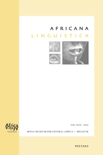
Africana Linguistica
Unveiling the Diversity of African DialectsAfricana Linguistica is a premier journal dedicated to the exploration and analysis of linguistic studies concerning African languages and their dialects. Published by PEETERS, a highly regarded academic publisher, this journal aims to promote scholarly discourse and research on the diverse linguistic landscapes of Africa. With its emphasis on both theoretical and applied linguistics, Africana Linguistica serves as a vital resource for researchers, professionals, and students alike, facilitating the dissemination of groundbreaking research and fostering greater understanding of African linguistic heritage.

Caplletra
Advancing Open Access Scholarship in LinguisticsCaplletra is a distinguished open-access journal dedicated to the field of linguistics and language studies, published by PUBL ABADIA MONTSERRAT since its inception. Based in Barcelona, Spain, this journal has been a vital resource for researchers, professionals, and students engaged in the intricate explorations of language and its applications since its transition to open access in 2005. Despite its current quartile ranking of Q4 within the Linguistics and Language category as of 2023, Caplletra continues to serve as an inclusive platform, fostering a dialogue that encourages a diverse range of scholarly contributions. Covering an expansive scope in the converged years from 2018 to 2024, it plays a crucial role in disseminating innovative research and insights. With its ISSN 0214-8188 and E-ISSN 2386-7159, Caplletra is committed to making academic work accessible to all, enhancing the landscape of linguistic scholarship and reflecting the evolving nature of language studies.

Studi e Saggi Linguistici
Fostering Critical Dialogues in Language StudiesStudi e Saggi Linguistici is a distinguished academic journal published by EDIZIONI ETS, based in Pisa, Italy. With its ISSN 0085-6827, this journal has established itself as a vital resource in the field of linguistics, particularly noted for its contributions since its inception in 2016. Although currently categorized in the lower quartile (Q4) by the 2023 metrics in the domains of Linguistics and Language within Scopus, it remains a significant platform for innovative research and critical discussions surrounding language studies. Focusing on both theoretical and practical aspects of linguistics, the journal serves as a nexus for scholars and practitioners alike, facilitating a rich interchange of ideas and knowledge in a rapidly evolving discipline. As an invaluable publication for researchers, professionals, and students, Studi e Saggi Linguistici is committed to advancing the understanding of linguistic phenomena and fostering scholarly communication in its field.
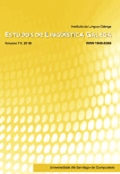
Estudos de Linguistica Galega
Exploring the Richness of Galician LinguisticsEstudos de Linguistica Galega, an esteemed journal published by the University of Santiago de Compostela, provides a critical platform for scholars engaged in the vibrant field of linguistics, particularly focusing on the Galician language and its surrounding linguistic phenomena. Launched in 2009, this Open Access journal enables unrestricted dissemination of research, facilitating engagement from a global audience. With an impact factor that positions it within the Q4 quartile in Linguistics and Language, it reveals a strong commitment to advancing the discourse in this niche. It ranks #691 out of 1088 in the Arts and Humanities category, underscoring its relevance in the academic landscape. The journal aims to foster collaboration and innovation among researchers and practitioners, making significant contributions to understanding linguistic diversity and its implications in contemporary society. Located in Santiago de Compostela, Spain, the journal encourages submissions that explore theoretical, empirical, and applied linguistic studies, thereby inviting researchers, professionals, and students to contribute to this growing field.

Palaeohispanica-Revista sobre Lenguas y Culturas de la Hispania Antigua
Connecting Cultures Through the Lens of History and LanguagePalaeohispanica-Revista sobre Lenguas y Culturas de la Hispania Antigua is a distinguished academic journal dedicated to the study of ancient Spanish languages and cultures. Published by the INST FERNANDO CATOLICO in Spain, this journal serves as an essential platform for scholars and researchers exploring the rich historical and linguistic heritage of Iberia. With a specific focus on the intersections of archaeology, history, linguistics, and cultural studies, Palaeohispanica has garnered substantial recognition, reflecting its commitment to high-quality research as evidenced by its rankings in prominent Scopus categories, reaching the 80th percentile in History and the 69th in Archaeology. While the journal operates without an Open Access option, it continues to contribute significantly to the academic discourse surrounding ancient Hispania from 2019 to 2023, ensuring that vital research is accessible to a discerning audience. As a Q3 and Q2 ranked publication in various relevant categories, it is an invaluable resource for professionals, researchers, and students eager to delve into the complexities of ancient languages and cultures.
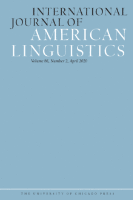
INTERNATIONAL JOURNAL OF AMERICAN LINGUISTICS
Elevating Scholarship in American Linguistic Studies.The INTERNATIONAL JOURNAL OF AMERICAN LINGUISTICS, published by University of Chicago Press, is a revered scholarly publication dedicated to the exploration and advancement of linguistic studies, particularly those related to the American linguistic landscape. With an ISSN of 0020-7071 and an E-ISSN of 1545-7001, this journal serves as a vital platform for researchers, professionals, and students interested in the nuances of language, dialects, and linguistic structures through rigorous academic inquiry. The journal has established a commendable impact, reflected in its ranking within the Q2 category in Linguistics and Language and its placements in the Scopus rankings, thereby positioning itself within the 50th to 53rd percentile of its respective fields. While the journal does not provide Open Access options, it continues to be a cornerstone resource for those seeking to expand their understanding of American linguistics, already converging from 1996 to 2024. Through its continued commitment to excellence, this publication remains essential for those aiming to contribute significantly to the field.

GLOTTA-ZEITSCHRIFT FUR GRIECHISCHE UND LATEINISCHE SPRACHE
Fostering Dialogue in the Classics CommunityGLOTTA-ZEITSCHRIFT FUR GRIECHISCHE UND LATEINISCHE SPRACHE, published by Vandenhoeck & Ruprecht GmbH & Co KG, stands as a pivotal academic journal within the field of Classics and Linguistics, demonstrating a strong commitment to advancing scholarly discourse surrounding the Greek and Latin languages. With a respectable Scopus ranking placing it in the top 77th percentile for Classics, this journal facilitates the dissemination of high-quality research and insights relevant to linguists, philologists, and historians alike. The journal operates without an open access model, ensuring its niche scholarship remains exclusive yet profoundly impactful. The HIndex is indicative of its longstanding influence, with the journal traces its roots back to its inception, with weighted contributions across several pivotal years. Furthermore, the journal's current standing—positioned in the Q2 quartile for Classics and Q3 quartile for Linguistics—reflects its thriving relevance and aspiration towards academic excellence, offering a significant platform for the exchange of ideas within the global scholarly community. Researchers, professionals, and students are encouraged to engage with the journal's contributions, as it consistently reflects the evolving dialogue in the study of ancient languages.
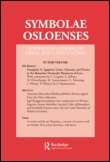
Symbolae Osloenses
Bridging Past and Present in Classical StudiesSymbolae Osloenses, published by TAYLOR & FRANCIS LTD, is a distinguished journal in the field of Classics, with a rich history dating back to its inception in 1922. This UK-based journal has continuously contributed to the scholarly discourse surrounding ancient cultures, languages, and literature, making it a crucial resource for researchers, educators, and students alike. Though it operates under a subscription model, its impact on the academic community is underscored by its recent inclusion in the 2023 Scopus rankings, where it holds a respectable position in the 65th percentile among its peers. With decades of published research spanning from 1924 to 2023, Symbolae Osloenses remains committed to fostering robust academic dialogue and advancing knowledge in the Classics, catering to a diverse readership seeking to explore the nuances of classical studies.
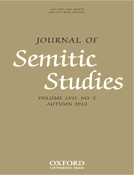
JOURNAL OF SEMITIC STUDIES
Unveiling the Rich Tapestry of Semitic StudiesJOURNAL OF SEMITIC STUDIES, published by Oxford University Press, is a premier academic journal that has served as a vital platform for interdisciplinary research in the fields of Semitic languages, history, culture, and religion since its inception in 1956. With a distinguished impact factor and a significant presence in various academic quartiles, including Q1 rankings in History and Literature, this journal is essential for scholars and practitioners seeking to advance their understanding of Semitic studies. The journal's scope includes comprehensive research articles, critical essays, and reviews that contribute to ongoing dialogues in Cultural Studies, Linguistics, and Religious Studies, making it indispensable for researchers, educators, and students alike. Although it currently does not offer open access, the high-quality, peer-reviewed content ensures rigorous academic standards while maintaining engagement with current trends and discussions in its respective fields. As a hub for innovative and influential scholarship, the JOURNAL OF SEMITIC STUDIES continues to foster an environment that encourages exploration and discovery within the rich tapestry of Semitic languages and cultures.

SKASE Journal of Theoretical Linguistics
Showcasing Groundbreaking Research in LinguisticsSKASE Journal of Theoretical Linguistics, published by the SLOVAK ASSOCIATION STUDY ENGLISH-SKASE, is a distinguished Open Access journal that expands the horizons of linguistic research and theoretical frameworks. With its ISSN N/A and E-ISSN 1336-782X, the journal has established itself as a pivotal resource for scholars in the field, achieving a commendable Q2 ranking in Linguistics and Language as of 2023. The journal, which has been in continuous publication since 2017, actively publishes innovative research studies, reviews, and theoretical discussions, easing access to groundbreaking work for academics and practitioners alike. Based in Slovakia, it connects a rich heritage of linguistic scholarship and is indexed in Scopus, ranking alongside its peers in both Arts and Humanities and Social Sciences categories. The SKASE Journal of Theoretical Linguistics is crucial for anyone interested in the evolving landscapes of linguistics, serving as an invaluable platform for disseminating knowledge and fostering collaboration amongst researchers worldwide.